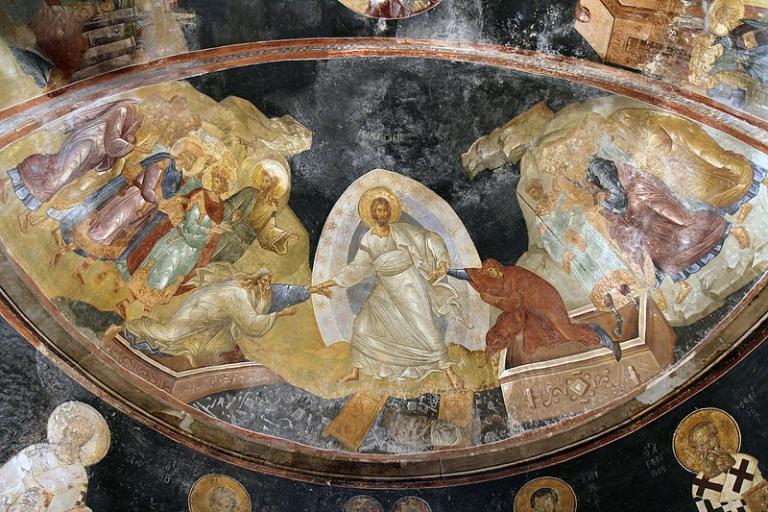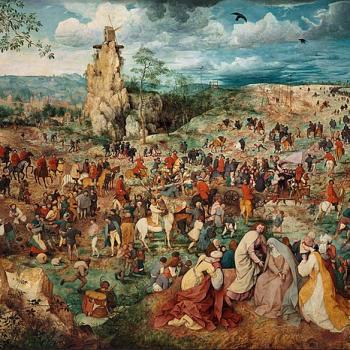
Χριστός ἀνέστη!
In Greece and throughout much of the Orthodox Christian world, this is the traditional greeting on Easter Sunday.
And it’s a good one.
Khristos anesti! Or, Christos anesti! Christ is risen!
To which the traditional response is
Ἀληθῶς ἀνέστη!
Alithos anesti! Truly, he is risen!
I want to wish everybody out there a joyous and wonderful Easter.
This is the greatest of great holidays for Christian believers.
***
In order, though, to forestall the cynical and sneering comments here on this blog that I’ve already seen elsewhere, I simply want to say that it’s deeply gratifying to me that, this year at least, Easter and April Fools Day occur together: Thus, the faithful celebrate the resurrection of Christ, while cynical unbelievers have a holiday for themselves.
***
Our Lord has written the promise of resurrection, not in books alone but in every leaf of springtime. (Martin Luther)
If Jesus rose from the dead, then you have to accept all that he said; if he didn’t rise from the dead, then why worry about any of what he said? The issue on which everything hangs is not whether or not you like his teaching but whether or not he rose from the dead. (Timothy Keller)
As I’ve done every Easter on this blog, I think, I share with you two of my favorite poems. The first is by A. E. Housman (1859-1936), a great classical scholar at University College London and then at the University of Cambridge, who was also a very fine poet. I think so highly of him that I’ve even made a pilgrimage to his grave. He was an agnostic who wanted to believe but found faith beyond him. The second is by the novelist John Updike (1932-2009), two-time winner of both the Pulitzer Prize and the National Book Award, who was, somewhat surprisingly to many, a fairly serious and thoughtful Christian, in his way.
“Easter Hymn,” by A. E. Housman
If in that Syrian garden, ages slain,
You sleep, and know not you are dead in vain,
Nor even in dreams behold how dark and bright
Ascends in smoke and fire by day and night
The hate you died to quench and could but fan,
Sleep well and see no morning, son of man.
But if, the grave rent and the stone rolled by,
At the right hand of majesty on high
You sit, and sitting so remember yet
Your tears, your agony and bloody sweat,
Your cross and passion and the life you gave,
Bow hither out of heaven and see and save.
“Seven Stanzas at Easter,” by John Updike
Make no mistake: if He rose at all
it was as His body;
if the cells’ dissolution did not reverse, the molecules
reknit, the amino acids rekindle,
the Church will fall.
It was not as the flowers,
each soft Spring recurrent;
it was not as His Spirit in the mouths and fuddled
eyes of the eleven apostles;
it was as His flesh: ours.
The same hinged thumbs and toes,
the same valved heart
that–pierced–died, withered, paused, and then
regathered out of enduring Might
new strength to enclose.
Let us not mock God with metaphor,
analogy, sidestepping, transcendence;
making of the event a parable, a sign painted in the
faded credulity of earlier ages:
let us walk through the door.
The stone is rolled back, not papier-mâché,
not a stone in a story,
but the vast rock of materiality that in the slow
grinding of time will eclipse for each of us
the wide light of day.
And if we will have an angel at the tomb,
make it a real angel,
weighty with Max Planck’s quanta, vivid with hair,
opaque in the dawn light, robed in real linen
spun on a definite loom.
Let us not seek to make it less monstrous,
for our own convenience, our own sense of beauty,
lest, awakened in one unthinkable hour, we are
embarrassed by the miracle,
and crushed by remonstrance.
***
If you’re in need of glorious Easter music as I am, here are two offerings from the Mormon Tabernacle Choir. The first is the great work of my late friend Robert Cundick. The second is by an Anglo-German composer named George Frederick Handel.
“The Redeemer : A Service of Sacred Music (Easter Concert)”












